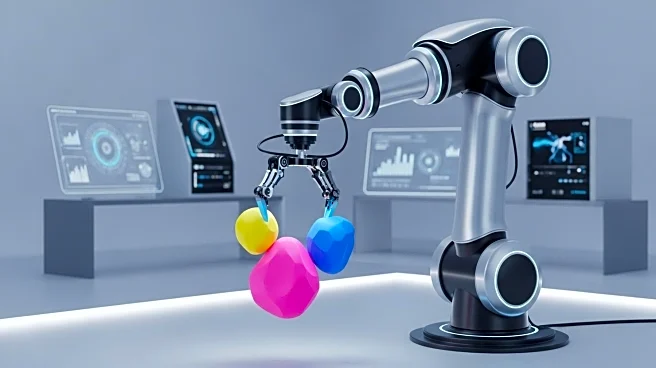What is the story about?
What's Happening?
During Advertising Week New York, senior leaders from WPP and Assembly Global discussed the transformative impact of AI on agency operations. The panel, titled 'How Agencies Can Thrive in the Age of Generative AI,' highlighted how AI is reshaping workflows, media planning, and creative development. Elav Horwitz from WPP and Kate Nible from Assembly Global emphasized that AI is not just a tool for efficiency but a catalyst for creativity. WPP has integrated AI into daily operations for 70,000 employees, with 50,000 custom agents built internally. The focus is on democratizing AI across the organization, allowing strategists to utilize AI in client presentations, thus changing traditional work methods. The panelists agreed that while technology is not the bottleneck, change management remains a challenge.
Why It's Important?
The integration of AI into agency operations signifies a shift from experimentation to operationalization, impacting team structures and client expectations. AI's ability to enhance efficiency and creativity offers agencies a competitive edge, enabling them to deliver more resonant and optimized digital experiences. This transformation is crucial as agencies and clients seek to leverage AI for large-scale creative projects, moving beyond low-funnel efficiencies. The restructuring around AI reflects a broader industry trend where creativity and collaboration are prioritized, potentially leading to new business models and client relationships. As AI becomes central to agency operations, it challenges traditional creative processes, fostering innovation and agility.
What's Next?
Agencies are expected to continue adapting their structures and workflows to fully integrate AI, with a focus on enhancing client collaboration and creative processes. As AI tools become more sophisticated, agencies will likely explore new ways to leverage AI for cultural impact and large-scale creative projects. The ongoing challenge will be to bring clients along in this transformation, ensuring they are equipped to keep pace with rapid technological advancements. Agencies may also face increased pressure to balance algorithmic optimization with emotionally resonant digital experiences, requiring close partnerships with clients.
Beyond the Headlines
The shift towards AI-driven operations raises ethical considerations around transparency and accountability in creative processes. As AI becomes more embedded in agency workflows, there is a need for governance frameworks to ensure fair and responsible use. Additionally, the democratization of AI within agencies could lead to a more inclusive creative environment, where diverse voices and ideas are amplified. This transformation may also influence cultural perceptions of creativity, as AI tools become integral to artistic expression and storytelling.

















